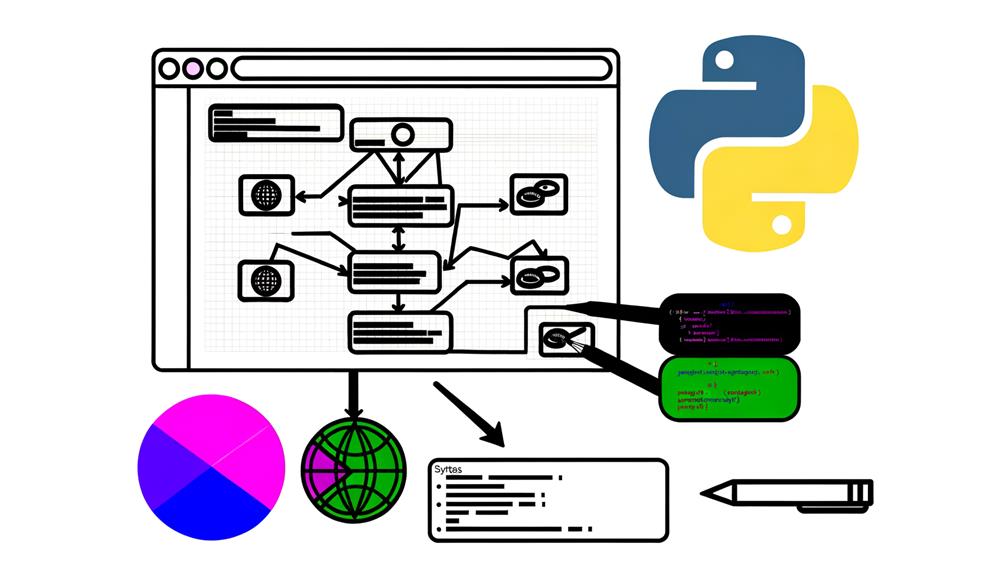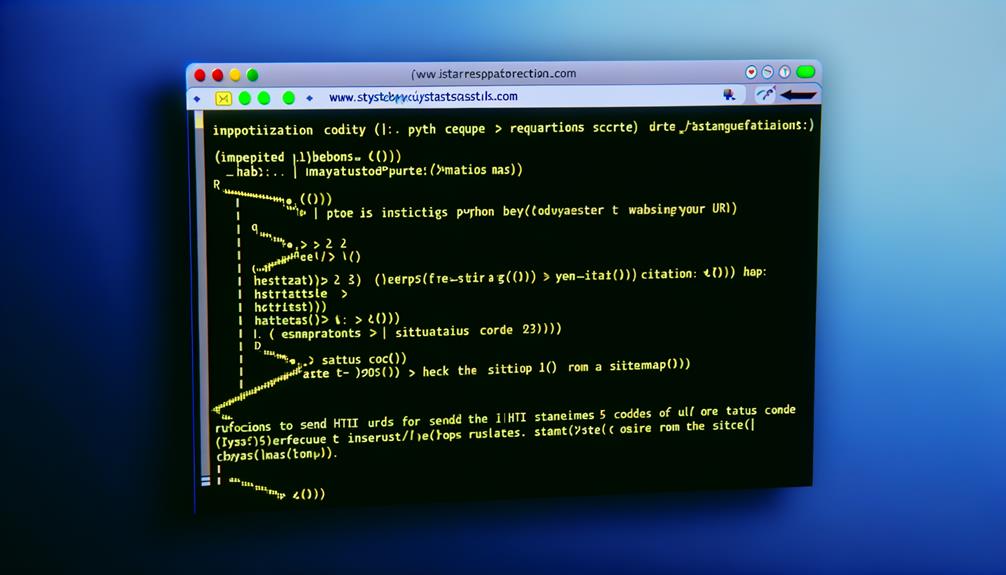We can utilize Python for checking status codes of URLs in a sitemap. Libraries like 'requests' and 'BeautifulSoup' are instrumental for this task. Using 'requests.get()', we retrieve status codes for each URL. It's effective for identifying issues such as 404 or 301 errors. Results are then organized in a data frame, making it easier to locate error URLs and improving website performance. This method provides key insights into sitemap health and aids in enhancing user experience. Stick around as we unravel additional strategies for SEO performance and user experience optimization.
Key Takeaways
- Python's requests library can be used to extract URLs from a sitemap for auditing.
- The 'requests.get()' function retrieves status codes for each URL in the sitemap.
- Organizing the status codes in a Python data frame can aid in identifying problematic URLs.
- Regular checks of status codes can ensure prompt rectification of issues, improving sitemap health.
- Analyzing and improving sitemap health via Python aids in enhancing SEO performance and user experience.
Understanding Pythonic SEO Practices
To effectively optimize a website for search engines, it's crucial to understand the role Python can play in SEO practices. We've found Pythonic URL parsing to be an invaluable tool in our SEO arsenal. Python libraries, like urllib3 or scrapy, allow us to handle URLs effectively, breaking them down into components for in-depth analysis.
Additionally, Python's prowess extends to a broad range of SEO automation techniques. We routinely utilize Python for tasks like image resizing, TF-IDF analysis, and website crawling. It also lets us analyze website content structures, check for grammar errors, and test robots.txt files. By categorizing URL parameters and applying the Apriori algorithm, we're able to improve search engine visibility significantly.
Analyzing Sitemap With Python

Diving into the heart of sitemap analysis, we find Python's prowess shines brightly in this domain as well, particularly with libraries such as Scrapy and Advertools. These tools provide a methodical approach to Pythonic sitemap parsing, allowing us to extract and scrutinize each URL. Through the use of Advertools' sitemap_to_df() function, we can transform complex sitemaps into user-friendly data frames. This simplifies the process of URL status analysis, making it easier to identify problematic links. While using Python scripts, we can perform an in-depth audit of a sitemap, reviewing all links for SEO optimization. With Python at our fingertips, we establish a systematic approach to managing SEO tasks and effectively enhancing website performance. This detailed analysis becomes a cornerstone in our effort to optimize online presence.
Importance of URL Optimization

In the realm of SEO, understanding the importance of URL optimization, specifically checking the status codes of URLs in a sitemap, is akin to laying the groundwork for a robust digital presence. We can't stress enough how vital URL validation techniques are in this process. By analyzing HTTP status codes, we can pinpoint problematic URLs swiftly and rectify them.
| URL Validation Techniques | Role in URL Optimization |
|---|---|
| Checking URL structure | Ensures URLs follow standard formatting and avoid issues with crawlers |
| HTTP status code analysis | Identifies potential issues with specific URLs, such as 404 or 301 errors |
| Canonicalization check | Confirms that each URL is unique and prevents duplication |
| URL parameter management | Helps avoid issues with dynamic URLs that can confuse search engine crawlers |
| Checking for secure (HTTPS) URLs | Ensures the security and credibility of the website |
Checking URL Status Codes

Cracking the code of HTTP status checks, we can swiftly identify and address any problematic URLs in our sitemap. Our URL status analysis involves Pythonic sitemap auditing, a methodical approach that allows us to dig deep into the health of our website.
- We start by extracting all URLs within our sitemap using Python's requests and BeautifulSoup libraries.
- Next, we utilize the 'requests.get()' function to retrieve the status code for each URL.
- We then create a data frame to organize and store our findings.
- Lastly, we analyze the results, identifying any URLs that returned errors.
This process provides a detailed insight into our sitemap's health, ultimately helping us improve our website's performance and user experience.
Impact of Sitemap Health

Understanding the impact of sitemap health on our website's SEO performance is a critical part of our optimization strategy, as it directly influences search engine communication and our site's quality score. When evaluating crawlability, a healthy sitemap enables search engines to effortlessly navigate and index our site's content. This not only improves our visibility but also enhances the user experience, as pages are easily accessible and load faster. However, a sitemap with numerous errors can hinder crawlability and negatively affect our site's reputation. Therefore, regularly checking the status codes of URLs in our sitemap ensures we rectify issues promptly, maintain a high-quality score, and uphold a seamless user experience. Ultimately, the health of our sitemap is paramount to achieving optimal SEO performance.
Holistic SEO and Python Usage

As we delve into the realm of holistic SEO, we can't ignore the crucial role Python plays in enhancing our optimization practices. With pythonic automation, we're able to conduct a comprehensive analysis of various SEO factors, ultimately improving our strategies. The following points further illustrate Python's significance:
- Python enables us to automate repetitive SEO tasks, freeing up time for more strategic work.
- Through Python, we can perform a detailed analysis of our site's SEO, identifying areas of improvement.
- Python's libraries are instrumental in handling and processing vast amounts of SEO data.
- With Python, we can proactively monitor our site's SEO health, ensuring it's optimized for search engines.
In essence, Python's role in holistic SEO is undeniable, proving to be a powerful tool for any SEO specialist.
Addressing URL Errors

While Python's role in holistic SEO is undeniable, it also offers us the ability to address one of the most common challenges in SEO: handling URL errors. When we delve into the realm of error handling strategies, Python's libraries are instrumental. They empower us to identify, analyze, and troubleshoot URL errors systematically. We can use Python to batch test URLs and return their status codes, identifying problematic areas swiftly. Troubleshooting techniques include analyzing the response data for 404 and 500 errors, which denote broken or internal server issues respectively. We can also pinpoint redirection issues by looking for 301 and 302 codes. Through meticulous tracking and rectification of these issues, we ensure the health of our sitemap, paving the way for optimal SEO performance.
Enhancing Sitemap Health Score

To boost our sitemap's health score, it's essential that we utilize Python's capabilities to their fullest, ensuring every URL returns the optimal 200 HTTP status code. This practice has dual benefits: improving crawlability and enhancing user experience.
Let's delve into how we raise our sitemap's health score:
- We employ Python's requests library to check the status code of each URL in our sitemap.
- If a URL returns a code other than 200, we investigate and rectify the issue, ensuring seamless crawlability.
- By improving our sitemap's health, we enhance the user experience, as dead links and redirects are minimized.
- Regularly monitoring our sitemap's status codes allows us to maintain a high health score, ultimately boosting our SEO efforts.
In this methodical way, we can ensure a healthier, more effective sitemap.
Frequently Asked Questions
What Specific Role Does Python Play in Optimizing a Websites Search Engine Visibility?
We're harnessing Python's power to optimize website visibility on search engines. Python algorithms are our go-to tools for automating SEO tasks. It's like having a trusty Swiss Army knife, always at the ready. We use Python to check URL status codes in sitemaps, ensuring they're operating at peak performance. This methodical approach helps us identify and fix issues quickly, significantly improving the health of our sitemap and boosting our search engine visibility.
How Does Python Contribute to the Creation and Analysis of a Websites Sitemap?
We use Python automation for sitemap generation and analysis. It simplifies extracting URLs, converting sitemaps into data frames, and checking status codes. With Python, we can quickly identify issues like non-canonical URLs or those returning non-200 HTTP statuses. This systematic approach helps us optimize our website's SEO performance, ensuring a healthy sitemap and effective communication with search engines.
Can Python Help in Identifying and Rectifying URL Errors for SEO Improvement?
Absolutely, we can use Python automation for error detection in URLs. It's possible to write a script that checks each URL's status code in a sitemap. By identifying problematic codes like 404 (not found) or 301 (moved permanently), we're able to rectify these issues, enhancing SEO performance. Python's efficiency and ease of use make it a powerful tool for this kind of task, allowing us to improve our website's visibility and effectiveness.
How Does Python Aid in Maintaining the Health Score of a Sitemap?
We're harnessing Python scripting benefits to maintain the health score of a sitemap. Through coding efficiency in SEO, we're able to check status codes of URLs. Ensuring a 200 status code for all URLs, we're effectively improving our website's standing with search engines. Also, we're able to quickly identify and rectify any errors, like 404s, through Python's efficient and methodical approach, thus maintaining a healthy sitemap.
How Does Python Fit Into the Overall Strategy of Holistic Seo?
We're firm believers in holistic SEO. Python's versatility plays a significant role in this, automating key SEO tasks, like checking sitemap health. The automated processes Python offers allow us to focus on other important elements of our strategy. It's not just about maintaining the health score of a sitemap, but also about optimizing URLs and analyzing content. Python automation is integral to our holistic approach, enhancing efficiency and effectiveness.



